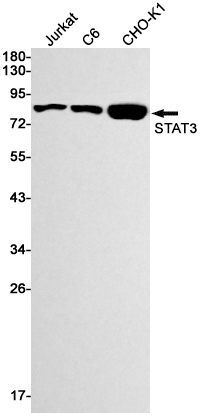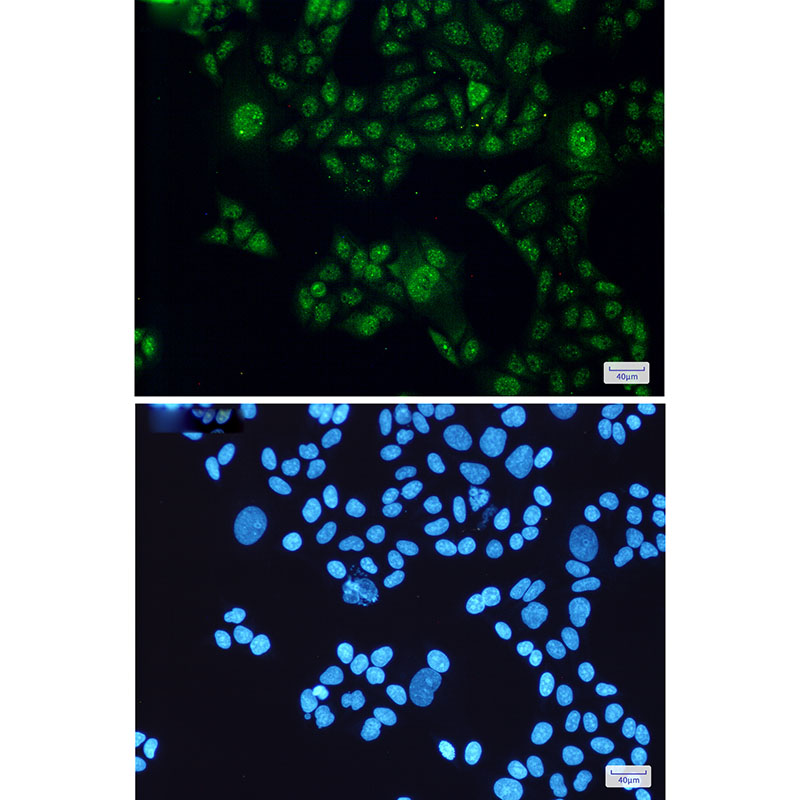

| WB | 1/500-1/1000 | Human,Mouse,Rat |
| IF | 1/20 | Human,Mouse,Rat |
| IHC | 咨询技术 | Human,Mouse,Rat |
| ICC | 1/50-1/200 | Human,Mouse,Rat |
| FCM | 咨询技术 | Human,Mouse,Rat |
| Elisa | 咨询技术 | Human,Mouse,Rat |
| Aliases | STAT3; APRF; Signal transducer and activator of transcription 3; Acute-phase response factor |
| Entrez GeneID | 6774 |
| WB Predicted band size | Calculated MW: 88 kDa; Observed MW: 88 kDa |
| Host/Isotype | Rabbit IgG |
| Antibody Type | Primary antibody |
| Storage | Store at 4°C short term. Aliquot and store at -20°C long term. Avoid freeze/thaw cycles. |
| Species Reactivity | Human,Rat |
| Immunogen | A synthetic peptide of human STAT3 |
| Formulation | Purified antibody in TBS with 0.05% sodium azide,0.05%BSA and 50% glycerol. |
+ +
以下是3篇关于STAT3抗体的参考文献及其摘要概括:
1. **"STAT3 Activation in Tumors: A Focus on Molecular Mechanisms and Translational Implications"**
- **作者**: Bromberg, J. et al.
- **摘要**: 该研究利用特异性抗STAT3抗体(包括识别磷酸化形式的抗体)分析STAT3在肿瘤中的持续激活状态,揭示了其通过促进细胞增殖和抑制凋亡驱动肿瘤发生,为靶向STAT3的癌症治疗提供了依据。
2. **"Development of a Phospho-Specific Monoclonal Antibody Against STAT3 for Detection of Constitutive Activation in Human Cancers"**
- **作者**: Schust, J. et al.
- **摘要**: 研究者开发了一种针对STAT3酪氨酸磷酸化(Y705)的单克隆抗体,验证了其在Western blot和免疫组化中的特异性,并应用于多种癌症样本,证实STAT3的异常激活与肿瘤进展相关。
3. **"Targeting STAT3 in Adoptive T Cell Therapy: Antibody-Based Inhibition Enhances Antitumor Immunity"**
- **作者**: Burdelya, L. et al.
- **摘要**: 通过抗STAT3抗体阻断肿瘤微环境中的STAT3信号通路,研究显示其可逆转免疫抑制并增强T细胞介导的肿瘤杀伤作用,为联合免疫疗法提供了实验支持。
这些文献涵盖了STAT3抗体的开发、机制研究及治疗应用,适用于实验设计或靶向治疗相关研究。
The STAT3 (Signal Transducer and Activator of Transcription 3) antibody is a crucial tool for studying the role of STAT3. a member of the STAT protein family involved in signal transduction and transcriptional regulation. STAT3 is activated by cytokines, growth factors, and oncogenic signals through phosphorylation at tyrosine 705 (Tyr705) or serine 727 (Ser727). This activation triggers dimerization via its SH2 domain, enabling nuclear translocation and regulation of target genes linked to cell proliferation, survival, differentiation, and immune responses. Dysregulated STAT3 signaling is implicated in cancers, autoimmune disorders, and chronic inflammation, making it a therapeutic target.
STAT3 antibodies are widely used in techniques like Western blotting, immunoprecipitation, immunohistochemistry (IHC), and immunofluorescence to detect STAT3 expression, localization, and activation states. They are categorized based on specificity: some recognize total STAT3 (phosphorylated and unphosphorylated forms), while others target phosphorylated Tyr705 or Ser727 residues to assess activation. Monoclonal antibodies offer high specificity, whereas polyclonal antibodies may detect multiple epitopes, enhancing sensitivity for low-abundance targets.
Researchers must validate STAT3 antibodies for specificity, as cross-reactivity with other STAT proteins or non-specific binding can yield false results. Applications extend to studying STAT3’s dual role in cancer (promoting tumor growth vs. suppressing anti-tumor immunity) and its involvement in inflammatory pathways. Reliable STAT3 antibodies are essential for elucidating its mechanisms in disease and evaluating therapeutic inhibitors in preclinical models.
×